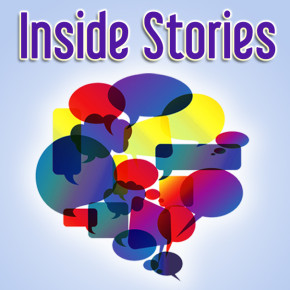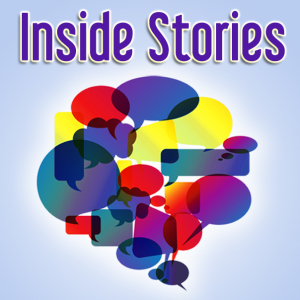 Why do we need Inside Stories?
Why do we need Inside Stories?
The art of storytelling and the art of truly listening to stories used to be central to the relationship between patients and doctors. Today those arts are often undervalued in the technological and biomedical approach that dominates both patient treatment and medical education. This loss creates disconnect between patients and their caregivers.
Narrative medicine, a relatively new movement in medical practice, seeks to elevate the role of a patient’s personal story so that a provider can attain a broad understanding of a patient’s life, which is necessary to administer meaningful care. Narrative medicine teaches providers to elicit and understand a patient’s story.
But it is not just patients who have stories to tell. Every individual involved in medical experiences has stories that need to be heard, including patients, providers, family members and medical students.
Medical school is an intense experience full of pressure to learn rapidly, to demonstrate proficiency, to “make the grade.” Students frequently report feeling isolated, scared and overwhelmed. And there are few platforms where they feel comfortable and encouraged to share their experiences and to connect with others undergoing similar experiences in an honest, uninhibited way. Inside Stories endeavors to create just such a platform.
Why are stories important?
Stories are connective, empowering, healing and transformative. But sometimes it’s challenging to speak our stories: we don’t have time, or a supportive space or a compassionate listener. We may devalue the power of stories, opting for silence instead of vulnerability and exposure. Also, when our stories are crammed into preconceived frameworks, or not invited forth at all, we can feel unseen, unheard and ashamed. But by telling our stories, and having them heard, we can feel recognized, validated and valued.
Listening to the accounts of these courageous, insightful students whose stories constitute this project, I hope others will follow suit and be inspired to share the personal stories at the heart of their journeys through the world of medicine.
What is the goal of Inside Stories?
The project’s mission is threefold:
- To offer an opportunity for medical students to share their stories as a means of personal healing, self-realization and empowerment;
- To provide a platform for students to explore the similarities and differences in experiences as medical students;
- To create community among students in the often isolative medical school environment.
What questions are students asked?
The interviews may focus on one or more of the following prompts:
- What personal experiences guided you to pursue medicine?
- What are the greatest challenges you have faced as a medical student?
- What role do self-care and your health have in your life as a medical student?
- Why are you choosing to learn and practice integrative medicine?
- Speak to an issue or experience you may not feel comfortable or allowed to share in a less open-minded medical school community.
- If you could change anything about medical education, what would it be and why?
If you are interested in sharing your story, please contact me, the curator, at anniewrobinson@gmail.com.
Where did this idea come from?
From an early and ongoing role as a patient, in addition to the roles of student, activist, teacher and doula, the telling and witnessing of stories in medical contexts has profoundly shaped me and inspired my professional pursuits. When I was an undergraduate at NYU’s Gallatin School of Individualized Study, I designed an interdisciplinary concentration that essentially amounted to narrative medicine. My thesis explored how storytelling can facilitate self-realization and an understanding of the relationship among stories, power and well-being. As a current graduate student in Columbia University’s Narrative Medicine Program, I am studying how stories provide a means of understanding the experiences of and relationships between providers and patients.
In 2008, I became a birth doula and currently practice as a full-spectrum doula, supporting individuals across the spectrum of pregnancy, including during abortion, miscarriage and fetal loss experiences. Serving as a doula has radically expanded my notions of what constitutes a story to include the mediums of silence, embodiment and energy.
What is narrative medicine?
Narrative medicine is a multidisciplinary approach that endeavors to make space for comprehensive, unique life stories to be shared and received in medical contexts. We practice narrative medicine largely by close reading and reflective writing, but also draw from a range of media and disciplines including but not limited to literature, films, performance, music, graphic narratives, visual art, psychology, autobiography, philosophy and ethics.
We use the phrase “narrative competency” to describe the narrative skills with which we aim to endow providers. Among the skills we focus on helping providers learn are to listen attentively to both patients’ stories and their own stories; to examine the meaning of the stories patients tell; and to use the experience of telling and listening to stories to deepen their relationship with patients.
Other desired skills for providers pursuing narrative competency include:
- Listening attentively to complicated narratives that are told partly in words but also in silences, gestures, test results, changes in the body, etc.
- Learning to identify and decipher metaphors and to navigate incoherent narratives.
- Being moved by the stories received, so providers act with compassion and empathy on their patients’ behalf.
- Exploring how providers’ own stories impact their ability to hear and interact with patients and colleagues.
- Examining and unpacking the intense, sometimes traumatic, experiences providers undergo in witnessing and caring for their patients.
In the words of medical sociologist Arthur Frank in The Wounded Storyteller: “You have to learn to think withstories. Not think about stories … but think with them. To think about a story is to reduce it to content and then analyze that content. Thinking with stories takes the story as already complete; there is no going beyond it. To think with a story is to experience it affecting one’s own life and to find in that effect a certain truth of one’s life.”
Inside Stories is an oral narratives project which invites medical students to share their experiences in medical school in the form of brief podcasts published and archived on in-Training. The project aims to provide a means of personal healing, self-realization and empowerment through the sharing and receiving of personal stories, as well as to cultivate community among students in the often isolating medical school environment.



